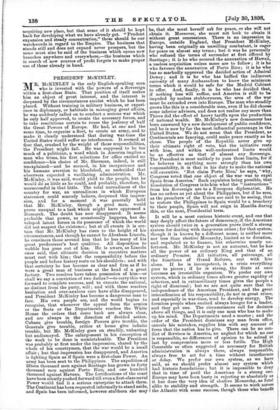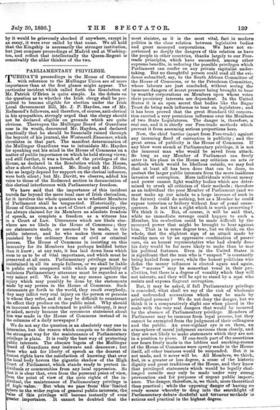PRESIDENT McKINLEY.
MR.bleKTNLEY is the only English-speaking man who is invested with the powers of a Sovereign within a first-class State. That position of itself makes him an object of great interest, and the interest is deepened by the circumstances amidst which he has been placed. Without training in military business, or experi- ence in diplomacy, or habitude in managing great affairs, he was suddenly called on to conduct a serious war which he only half approved, to create the necessary forces, and to take resolutions certain to rouse the jealousy of half the Great Powers of Europe. He had, at one and the same time, to organise a fleet, to create an army, and to make it clearly understood that during war-time the United States would suffer no interference. It seemed at first that, crushed by the weight of these responsibilities, the President might fail. He was supposed to be too much of a politician, a word which in America implies a man who trims, his first selections for office excited no confidence—his choice of Mr. Sherman, indeed, is still -unexplained—and he seemed, in his inexperience and his humane aversion to bloodshed, so undecided that observers expected a vacillating administration. Mr. McKinley, it was said, would yield to the people, but he would do as little as he could, and probably, therefore, be unsuccessful in that little. The total unreadiness of the country for war, an unreadiness in which European statesmen could scarcely believe, deepened this impres- sion, and for a moment it was generally held that Mr. McKinley, though a good man, would prove unequal to a task which might have oppressed a Bismarck. The doubt has now disappeared. It seems probable that power, as occasionally happens, has de- veloped latent forces in its possessor of which the world did not suspect the existence ; but at all events it is cer- tain that Mr. McKinley has risen to the height of his -circumstances, and though he cannot be Abraham Lincoln, he convinces those around him that he has many of his great predecessor's best qualities. All disposition to wobble has gone out of him. He is aware, as Lincoln once said, that ultimate decision in executive matters must rest with him ; that the responsibility before the people and before history rests on his shoulders ; and with that certainty he has become as clear and firm as if he were a great man of business at the head of a great factory. Two resolves have taken possession of him—or shall we say a conviction of two duties ?—to carry this war forward to complete success, and to execute the national, as distinct from the party, will ; and with those resolves hesitation and over-anxious care have alike disappeared, and President McKinley has become a dangerous man to face. His own people see, and the world begins to recognise, that whenever the appeal from the armies or the fleets or the Departments reaches the White House the orders that come back are always clear, and are always in the direction of decided action. 'Cubans give trouble, foreign Powers give trouble, the Generals give trouble, critics at home give infinite trouble, but Mr. McKinley goes on steadily, unhasting but undismayed. The enlargement in his conception of the work to be done is unmistakeable. The President was probably at first under the impression, shared by the whole of his countrymen, that the war would be a small affair ; but that impression has disappeared, and America is fighting Spain as if Spain were a first-class Power. An army has been sent to the Philippines. The expedition of fifteen thousand men against Santiago has grown to forty thousand men against Porto Rico, and one hundred thousand against Havana. The fortifications of the coast have been silently pushed forward till even a first-class naval Power would find it a serious enterprise to attack them. The Continent has been requested informally to stand aside, and Spain has been informed, however stubborn she may be, that she must herself ask for peace, or she will not obtain it. Moreover, she must not look to obtain it without great concessions. There is an impression in Europe, outside England, that President McKinley, having been originally an unwilling combatant, is eager for peace on almost any terms; but it was he personally who refused the terms of surrender at first offered by Santiago ; it is he who secured the annexation of Hawaii, a useless acquisition unless more are to follow ; it is he who favours the annexation of Porto Rico ; it is he who has so markedly approved the decided action of Admiral Dewey ; and it is he who has baffled the indiscreet curiosity of many Ambassadors to know the minimum terms which it would be safe for the Madrid Cabinet to offer. And, finally, it is he who has decided that, if nothing less will suffice, and America is still to be impeded by useless stubbornness, the area of the war must be extended even into Europe. The man who steadily grows like this is a considerable man, even if he did choose some inferior advisers, and does not realise any more than Thiers did the effect of heavy tariffs upon the production of national wealth. Mr. McKinley's new demeanour has been answered by a new development of public confidence, and he is now by far the most influential personage in the United States. We do not mean that the President, as Continentals are fancying, could make peace exactly as he chose. The people of the Republic never give up their ultimate right of veto, but the initiative rests with him, and within well-understood limits would be as effective as that of almost any Sovereign. The President is most unlikely to pass those limits, for if he believes in anything more strongly than his own responsibility, it is that in his duty to make the national will executive. 'Not claim Porto Rico,' he says, why, Congress voted that one object of the war was to expel Spain from America.' Such expulsion being possible, that Resolution of Congress is to him what the " instructions " from his Sovereign are to a European diplomatist. He has no orders as yet about the Philippines, but if he sees, as the preachers of the Union are said to be seeing, that to restore the Philippines to Spain would be a treachery to their people, Spain will not reign in Manilla, during this, or the next, Presidential term.
It will be a most curious historic event, and one that may deeply affect the future of democracy, if the American system should twice in a generation prove itself a strong system for dealing with dangerous crises ; for that system, though it is known by a different name, is neither more nor less than elective Monarchy, limited as to duration, and regulated as to finance, but otherwise nearly un- fettered. Mr. McKinley is not an autocrat, but he has all the power of an ordinary King and that of an ordinary Premier. All initiative, all patronage, all the functions of Grand Referee, rest with him alone. If he is incompetent, in a crisis everything goes to pieces ; if he is strong, the State at once becomes an irresistible organism. We prefer our own system, which in ordinary times allows greater rapidity of selection, and in extraordinary times gives the people a right of dismissal ; but we are not quite sure that the independence of the American President, and the great intensification of his responsibility, do not in great crises, and especially in war-time, tend to develop energy. The formless people when excited always hunger for a leader, and they get one. The circumstances call for decision above all things, and it is only one man who has to make up his mind. The Departments need a master ; and the order of the President dismisses any man from office, cancels his mistakes, supplies him with any amount of force that the nation has to give. There can be no con- flict of Serviees in America, no neglect for which no one is responsible, no differences of opinion to be solved at last by compromises more or less futile. The High Constable so often suggested as necessary for British administration is always there, always responsible, always free to act for a time without interference or delay. We prefer our own system, as we have said, as we should prefer almost any system which had historic foundations ; but it is impossible to deny that in time of peril the American is a strong one. Europe may have been hasty in rejecting so absolutely as it has done the very idea of elective Monarchy, as fatal alike to stability and strength. It seems to work woes the Atlantic with some success, though those who benefit by it would be grievously shocked if anywhere, except in an essay, it were ever called by that name. We all hold that the Kingship is necessarily the stronger institution, but, just compare proceedings at Madrid and at Washing- ton, and reflect that intellectually the Queen-Regent is conceivably the abler thinker of the two.



































 Previous page
Previous page